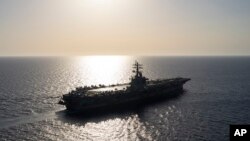With the United States-brokered ceasefire between Israel and Hezbollah barely holding, Yemen’s Iran-backed Houthi rebels continue to attack commercial vessels transiting the Red Sea, and the Western military ships protecting them.
The Houthis say their 14-month-long campaign is to show solidarity with Hamas and opposition to Israel by undermining the United States and its allies’ efforts to secure this vital maritime commercial route.
On December 1, Houthi military spokesperson Yahya Saree announced the militant group had launched a series of attacks on a U.S. Navy ship escorting American merchant vessels through the Gulf of Aden, which connects the Red Sea to the Arabian Sea.
“The operation was carried out with 16 ballistic and winged [cruise] missiles and a drone in the Arabian Sea and the Gulf of Aden, and the hits were accurate and direct,” Saree said.
That is false.
On December 1, U.S. Central Command, or CENTCOM, addressed a series of Houthi attacks launched from November 30 to December 1.
CENTCOM said the U.S. Navy destroyers USS Stockdale and USS O’Kane were escorting three U.S.-owned, operated and flagged merchant vessels in the region.
“The destroyers successfully engaged and defeated three anti-ship ballistic missiles [ASBMs], three one-way attack uncrewed aerial systems [OWA UAS] and one anti-ship cruise missile [ASCM], ensuring the safety of the ships and their personnel, as well as civilian vessels and their crews,” CENTCOM said.
CENTCOM added, "The reckless attacks resulted in no injuries and no damage to any vessels, civilian or U.S. Naval.”
The Houthi identified the three vessels as the containership Maersk Saratoga, bulk vessel Liberty Grace and product tanker Stena Impeccable.
The Maritime tracker open-source intelligence tool’s Vessel Identifier shows Maersk Saratoga intact, as it arrived at the port of Djibouti on December 2 and departed on December 3.
The tracker shows Liberty Grace docked in Djibouti on December 1, and Stena Impeccable on a route to Singapore. No damage or repair was reported.
Despite the absence of evidence, the Times of India picked up the Houthis’ claim, reporting that the Yemeni rebels hit U.S. vessels with 17 missiles and sunk all four of them. The Daily Caller’s fact-checking arm debunked that report, stating there was no evidence of the attack being successful.
The Houthis repeatedly have made false claims about successfully attacking U.S. warships and other vessels.
On September 27, the Houthis claimed they damaged three U.S. Navy warships after launching nearly two dozen missiles and bomber drones. The USS Stockdale, USS O’Kane and USS Spruance were in the region as part of the USS Abraham Lincoln carrier strike group at the time of that attack.
Pentagon Deputy Pentagon Press Secretary Sabrina Singh said no U.S. ships were damaged or hit in that attack, and no U.S. personnel were injured. Neither the Houthis nor media presented evidence contradicting Singh’s assessment.
In June and earlier this year, the Houthis and social media users repeatedly spread false claims that the Yemeni militant group had struck and even sunk the U.S. aircraft carrier Dwight D. Eisenhower in the Red Sea.
“I think it’s been about two or three times in the past six months we’ve allegedly been sunk, which we have not been,” the Eisenhower’s leader, Captain Christopher Hill, told Associated Press reporters onboard the carrier in June.
On January 31, the Houthis claimed they had targeted the USS Gravely, a guided missile destroyer that has participated in retaliatory strikes against Houthi military infrastructure.
Media aligned with the Iranian-backed Hezbollah, a Lebanon-based militant group, falsely claimed the Houthis had “directly and accurately” hit the destroyer. No evidence ever surfaced supporting those claims.
On January 22, the Houthis also falsely claimed they successfully attacked a U.S. military cargo ship, the Ocean Jazz, in the Gulf of Aden.
Social media users sympathetic to the Houthis’ cause or otherwise seeking to drum up engagement have repeatedly falsified or exaggerated the success of Houthi efforts to attack Western military vessels and commercial ships operating in the region.
To support the Houthis' disinformation narrative, they have regularly repurposed old and/or unrelated images and footage, which they attempt to pass off as successful Houthi attacks.
The Houthis falsely claimed targeting only British, Israeli and U.S. ships, yet they struck merchant vessels sailing under other nations’ flags.
Since November 19, 2023, the Houthi have launched attacks on over 90 merchant and commercial vessels, sinking two ships and killing four sailors in their campaign.
They also hijacked the Bahamas-flagged Galaxy Leader commercial ship in November 2023 and continue to hold its crew hostage.
In response, the U.S., in conjunction with allies, began conducting joint strikes on the Houthi-controlled territory in January to degrade the rebels’ ability to carry out what CENTCOM called their ”illegal and reckless attacks on U.S. and international vessels and commercial shipping in the Red Sea.”
Opponents of the United States have attempted to frame the U.S. and its allies as the aggressors for responding to Houthi hostilities.
The Houthis, nonstate actors, repeatedly have claimed U.S. warships have no right to enter the Red Sea.
Under international law, there is nothing prohibiting U.S. military vessels from navigating international waters or defending themselves or others from attacks.
The Houthi attacks on commercial and other vessels also have occurred in international waters, violating the right of innocent transit and passage.







